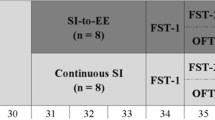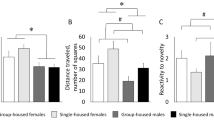Abstract
Rationale: Social isolation is anxiogenic and may change the effects of anxiolytic drugs. These effects are generally attributed to ”isolation stress”. However, isolation does not affect basal corticosterone levels; thus, it cannot be considered stressful. On the contrary, isolation deprives animals of mild daily stressors that are inherent to social life. Since mild stressors were shown to be anxiolytic in rats, it was postulated that short-term, repeated stressors may abolish the effects of isolation. Objectives: The aim of the present study was to investigate whether short-term, repeated, mild social stress can abolish the consequences of isolation on anxiety and on the effects of chlordiazepoxide. Methods: Rats were housed in groups or in individual cages for 5 days (isolates). Half of isolates were daily submitted to the attacks of a resident rat for 30 min per day, on 4 consecutive days (stressed isolates). On day 5, rats were treated either with vehicle or with chlordiazepoxide and submitted to the elevated plus-maze test. Endocrinological consequences of experimental manipulations were assessed in a different set of rats. Results: Plasma ACTH and corticosterone levels were similar in the three groups. Weight gain was higher, while plasma growth hormone was lower in stressed isolates, both effects being consistent with a mild stress. Isolation had a clear anxiogenic effect. This effect was completely abolished by the daily experience of social stress. Chlordiazepoxide had a significant anxiolytic effect in all three groups. Its effects on classical plus-maze variables did not differentiate the three groups. However, chlordiazepoxide decreased risk assessment activity only in isolates. Conclusions: The lack of appropriate endocrinological changes challenges the concept of ”isolation stress”. However, isolation was anxiogenic in our study and it also induced subtle changes in the effects of chlordiazepoxide. It appears that mild daily stressors have a protective effect against the effects of isolation.
Similar content being viewed by others
Author information
Authors and Affiliations
Additional information
Received: 23 May 1998 / Final version: 3 December 1998
Rights and permissions
About this article
Cite this article
Haller, J., Halász, J. Mild social stress abolishes the effects of isolation on anxiety and chlordiazepoxide reactivity. Psychopharmacology 144, 311–315 (1999). https://doi.org/10.1007/s002130051012
Issue Date:
DOI: https://doi.org/10.1007/s002130051012




